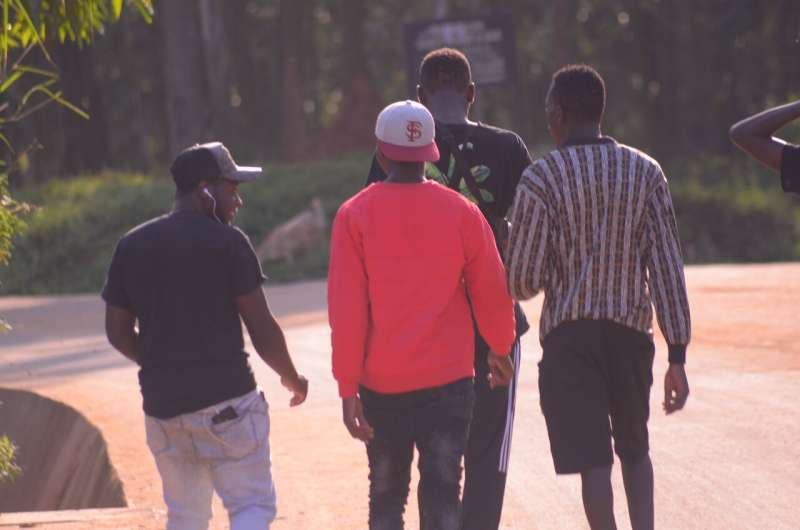This article has been reviewed according to Science X's editorial process and policies. Editors have highlighted the following attributes while ensuring the content's credibility:
fact-checked
trusted source
written by researcher(s)
proofread
Young Black men in Canada face racism, ageism and classism when looking for work

Youth employment in Canada continues to be a concern. Young people between the ages of 15 and 30 are less likely to find and sustain employment compared to an older population of Canadians.
According to Statistics Canada, around 11 percent of youth aged 15–24 are unemployed. Among young Black Canadians that number is around 17.5 percent.
Black people in Canada continue experiencing oppression and dehumanization because of how their skin color is viewed and represented.
Impoverished Black male youth in particular encounter racism, ageism, classism and gender biases when looking for work. These are stereotypes which encourage many Canadian employers to view them as not good for business and unemployable.
Intersecting oppressions
As a sociocultural anthropologist who is dedicated to uncovering the nuances in Black youth un(der)employment, I have found that impoverished Black youths' inability to find employment is due to intersectional oppressions such as ageism and classism, which is also tied to their Blackness.
The challenges they face vary among different Canadian cities. In my doctoral study about impoverished Black male youth in Montréal, Ottawa and Toronto, I found these youth are denied employment opportunities for multifaceted reasons. These include discrimination based on a person's address, age, classism and gender biases—particularly about the negative stereotypical ideas that surround Black manhood.
The sociological study focused on Black male youth between the ages of 15 to 29 who live in low income areas between Montréal, Toronto and Ottawa. The qualitative study gathered data from 21 young Black men through semi-structured interviews and focus groups.
Political philosopher Frantz Fanon warned us of the dangers of recognizing Black people's experiences as one. Black people have differences that contribute to their humanness, which the colonizer has denied.
Similarly, when we presume all youth have the same experiences, we fail to take diversity seriously and may be falsely interpreting the lived experiences of many youth.
There was never one reason, such as anti-Black racism, which was the cause of employment barriers among these young people. The reality is these youth experience overlapping discrimination that are tied to anti-Black racism, such as classism, which varied based on different encounters with various employers.
My study found that impoverished Black male youth are tied to a socially manufactured hierarchical system that considers race, gender, sexuality, ability, age, social class and education. Unfortunately, employers excluded them because of the many intersections that make up their identities.
Although the Canadian government recognizes Black youth face barriers to employment, few politicians recognize that more needs to be done to create inclusivity in the workplace. The lived experiences of impoverished Black male youth and their ability to access employment are not the same nationwide.
Secularism laws impact opportunities
My study also found that many Black male youth in Montréal are also at the mercy of Québec's secularism law. Black male youth in the city must deal with classism and constantly being tied to the unworthy idea that they do not serve many employees' needs. This is based on the stereotypical ideas of what their Black masculinity represents.
Some of these young people adorn religious clothing, which has complicated their job-seeking strategies. Many young Black men living in the province face discrimination based on their religious values and their clothing or attire was a reason they were overlooked for employment.
These secularism laws are an added issue for impoverished Black male youth seeking employment, as many of them do not feel a sense of belonging, and are constantly faced with intersecting social oppressions where they are overlooked for employment opportunities.
We must realize that some laws and policies may be suitable for some Canadians. But in an effort to create legislation, there is a disregard for the social concerns of those who have been othered. Creating laws without considering them adds to a sense that they do not belong in this country.
Thinking through Black masculinity
For years, Black Canadian scholars such as Carl James, Tamari Kitossa and myself have discussed Black masculinities in Canada and how Black men are seen as dangerous, untrustworthy men undeserving of a sense of belonging in the white settler nation-state.
These historical narratives continue to inform our present day society, which has complicated how impoverished young Black men seek and obtain employment. Failing to recognize these tensions among young Black men is distancing ourselves from the lived experiences rooted in history, which are playing out in our contemporary moments.
The young Black men I spoke to courageously shared what it means to seek employment while having to negotiate your right to be treated fairly. When these young men do eventually obtain employment, they are often trapped in low-paying, menial labor positions reflective of unfair stereotypes about Black masculinity.
This type of work degrades their humanity and selfhood. The dehumanization faced by these youth when they attempt to seek employment demonstrates how they are othered not solely by their race.
For there to be equitable hiring practices, governments and employers must understand anti-Black racism in light of the intertwined forms of discrimination that often accompany it.
Homogenizing the lived experiences of Black youth can cause harm and promote misconceptions about their lived experiences. I urge people to refrain from thinking about racialized people based on their race alone. Instead, we should intentionally focus on the individuality of people. We must practice cultural competency which invites us to appreciate people and their different lived experiences.
Provided by The Conversation
This article is republished from The Conversation under a Creative Commons license. Read the original article.![]()





















